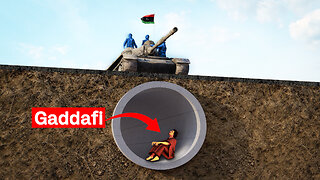Premium Only Content

Episode 1994: During his Trial: My kingdom is not of this world - Part 11
This is the 11th of Jesus’ 22 last statements before His death:
"So Pilate entered his headquarters again and called Jesus and said to him, 'Are you the King of the Jews?” (John 18:33) "Jesus answered, 'My kingdom is not of this world. If my kingdom were of this world, my servants would have been fighting, that I might not be delivered over to the Jews. But my kingdom is not of this world.'" (John 18:36)
The non-believers at that time saw Jesus as a radical, an activist, who wanted to bring political and social change to the world. Even some of those who DID believe, who were waiting for the Messiah, struggled with the idea that Jesus was the Son of God. And so the ignorance of men like Caiaphas and Pilate is even more glaring because they cannot comprehend who Jesus is let alone what He came to do. Jesus came to serve, not to be served. Jesus came to make all things new by His life, death, and resurrection. Pilate never could have understood this.
So Christ, standing before Pilate, answers his question by saying, “My kingdom is not of this world.” Jesus’ kingdom is a heavenly, spiritual kingdom, not an earthly kingdom filled with sin and evil. We know that violence was not a part of growing and establishing Jesus’ ministry. He did not come to earth to form an empire or a political group, but rather to bring the Word of God to those who had been waiting for the Messiah. He came to teach. Jesus said to His disciples in the Sermon on the Mount as recorded by Matthew 5: 13-16, “You are the salt of the earth. But if the salt loses its savour, wherewith shall it be salted? It is good for nothing any more but to be cast out, and to be trodden on by men. You are the light of the world. A city seated on a mountain cannot be hid. Neither do men light a candle and put it under a bushel, but upon a candlestick, that it may shine to all that are in the house. So let your light shine before men, that they may see your good works and glorify your Father who is in Heaven.”
How could a man be on trial who speaks such beautiful and glorious words? What kind of men put such a man on trial? Jesus was on this earth for a short time and did all that He could to spread the word of God. To the faithful who called him Teacher and Master, to those who believed in Him, those are the servants to whom Jesus refers when He says, “If my kingdom were of this world, my servants would have been fighting, that I might not be delivered to the Jews.”
St. Augustine said this about Christ’s response to Pilate, “This is what the good Master wished us to know. First, we had to learn, how vain was the notion of His Kingdom that it should be hostile, either to the Romans or to the Jews. When the Roman governor asked Jesus “Art thou King of the Jews?” the Lord could have answered: “My kingdom is not of this world.” But Christ asked in His turn, ”Dost thou say this of thyself, or have others told thee of me?” because, He wished to show, from Pilate’s answer, that He, Jesus, had been charged with this, as a crime before Pilate, by the Jews. Thus He laid bare to us the thoughts of men, which He knew and which were vain. After the reply of Pilate, Jesus replied to them, to both Jews and Gentiles, more fittingly and more opportunely, “My Kingdom is not of this world.”
Other passages help describe the “other worldliness” of Heaven from the gospel of Mark, to St. Cyril of Alexandria to Pope Pius XI:
In Mark 4:30-32, we read, And he said, “With what can we compare the kingdom of God, or what parable shall we use for it? It is like a grain of mustard seed, which, when sown on the ground, is the smallest of all the seeds on earth, yet when it is sown it grows up and becomes larger than all the garden plants and puts out large branches, so that the birds of the air can make nests in its shade.”
St. Cyril of Alexandria, Father and Doctor of the Church said this, “The Kingdom of God is within you. That is, it depends on your own wills and is in your own power, whether or not you receive it. Everyone, that has attained to justification, by means of the faith in Christ and decorated by every virtue, is counted worthy, of the kingdom of heaven.”
I conclude with this passage from Pope Pius XI: “This kingdom is spiritual and is concerned with spiritual things…The gospels present this kingdom as one which men prepare to enter by penance, and cannot actually enter except by faith and by baptism… It demands of its subjects a spirit of detachment from riches and earthly things, and a spirit of gentleness. They must hunger and thirst after justice, and more than this, they must deny themselves and carry the cross.”
Thank you for listening.
-
 LIVE
LIVE
Game On!
14 hours agoTom Brady And The Las Vegas Raiders ARE BACK! 2025 NFL Preview!
8,663 watching -
 LIVE
LIVE
The Bubba Army
2 days agoShould RaJa Jackson Be Arrested? - Bubba the Love Sponge® Show | 8/25/25
4,009 watching -
 LIVE
LIVE
FyrBorne
13 hours ago🔴Warzone M&K Sniping: Builds So Strong They Think I'm Hacking
642 watching -
 LIVE
LIVE
BEK TV
2 days agoTrent Loos in the Morning - 8/25/2025
2,560 watching -
 4:23
4:23
Blackstone Griddles
15 hours agoEasy Salmon Dinner on the Blackstone Griddle
19.4K1 -
 8:10
8:10
WhaddoYouMeme
1 day ago $0.06 earnedChristians, Before You See “Testament”, Watch this!
2.34K4 -
 8:42
8:42
Freedom Frontline
14 hours agoDurbin’s Trump Smear Video Just HUMILIATED Him in the Senate
9.21K1 -
 10:56
10:56
ariellescarcella
12 hours agoThe Shocking Divide Among College Voters Sparks Worry For America
7.57K6 -
 13:09
13:09
Forrest Galante
10 hours agoWildlife Expert Reacts To Deadly Australian Animal TikToks
47K5 -
 12:08
12:08
Zoufry
2 days agoThe Mystery of Gaddafi's Final 24 Hours
14.7K11